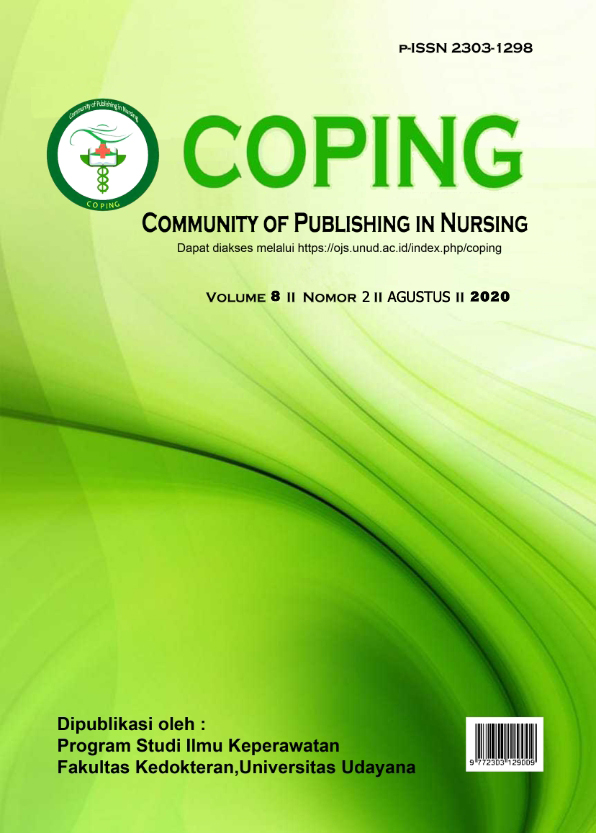HUBUNGAN FAKTOR PSIKOLOGIS DENGAN RISIKO BUNUH DIRI PADA REMAJA SMA DAN SMK DI BANGLI DAN KLUNGKUNG
Abstract
Suicide are currently increasing throughout the world including in Indonesia and it makes suicide become the second leading cause of death at the age of 15 to 29 years old. The cause of suicide cannot be exactly identified. However, there are several factors contribute to suicide such as psychology, biology, family, environment, and sexual orientation. This study aimed at analyzing the correlation among psychological factors (hopelessness, depression, anxiety and stress) with suicide risk in senior and vocational high school adolescents in Bangli and Klungkung Regency. Population in this study was senior and vocational high school adolescents in Bangli and Klungkung whose ages ranging from 15 to 18 years. The sampling technique applied in this research was Non Probability Sampling with Purposive Sampling technique. The instruments used in this study were standard questionnaires named Beck Hopelessness Scale, Depression Anxiety and Stress Scale, and Scale of Suicide Ideation. The results of this study showed p <0.001. It means that there is a meaningful relationship between psychological factors and suicide risk in senior and vocational high school adolescents in Bangli and Klungkung. Moreover, it has a positive correlation which means that the more psychological factors are, the more suicide risk will be. Furthermore, the less psychological factors, the less its risk of suicide will be. Lastly, the strength of the correlation among variables is found weak.
Downloads
References
Azizah, L. M., Zainuri, I., & Akbar, A. (2016). Buku Ajar Keperawatan Kesehatan Jiwa: Teori dan Aplikasi Praktik Klinik. Yogyakarta: Indomedika Pustaka.
Badan Kependudukan dan Keluarga Berencana Nasional (BKKBN). (2013). Kajian Profil Penduduk Remaja (10-24 Tahun): Ada Apa dengan Remaja?. Jakarta: Pusat Penelitian dan Pengembangan Kependudukan-BKKBN.
Balipuspanews. (2018). Masih Dirawat, Korban Percobaan Bunuh Diri karena Pacar di Level 21 Mall. Retrieved from: https://www.balipuspanews.com/masih-dirawat-korban-percobaan-bunuh-diri-karena-pacar-di-level-21-mall.html
Beiter, et al. (2014). Journal of Affective Disorders. The Prevalence and Correlates of Depression, Anxiety, and Stress in a Sample of Collage Students. Page: 90-96.
Bentley, et al. (2016). Clinical Psychology Review. Anxiety and its Disorders as Risk Factors for Suicidal Thoughts and Behaviors: A Meta-analytic Review. Page: 30-46.
Centre For Disease Control and Prevention (CDC). (2015). Understanding Suicide. National Center for Injury Prevention and Control: Division of Violence Prevention.
Centre For Disease Control and Prevention (CDC). (2016). Suicide. Website : www.cdc.gov/ViolencePrevention/suicide/index.html
Chung, S. S. & Joung, K. H. (2012). The Journal of School Nursing. Risk Factors Related to Suicidal Ideation and Attempted Suicide: Comparative Study of Korean and American Youth.
Donsu, J. D. T. (2017). Psikologi Keperawatan. Yogyakarta: Pustaka Baru Press
Gallagher, M., Prinstein, M. J., Simon, V. & Spirito, A. (2014). J Abnorm Child Psychol. Social Anxiety Symptoms and Suicidal Ideation in a Clinical Sample of Early Adolescents: Examining Loneliness and Social Support as Longitudinal Mediators.
Huen, J. M. Y., Ip, B. Y. T., Ho, S. M. Y & Yip, P. S. F. (2015). Hope and Hopelessness: The Role of Hope in Buffering the Impact of Hopelessness on Suicidal Ideation. Plos One. Volume 10, No. 6.
Ibrahim, N., Amit, N., & Suen, M. W. (2014). Psychological Factors as Predictors of Suicidal Ideation among Adolescents in Malaysia. 1-6.
Jaiswal, S. V., Faye, A. D., Gore, S. P., Shah, H. R., & Kamath, R. M. (2016). Journal of Postgraduate Medicine. Stressful life events, hopelessness, and suicidal intent in patients admitted with attempted suicide in a tertiary care general hospital. Vol. 62, No. 2, 102-104
Jha, K.K., Singh, S.K., Nirala, S.K., Kumar, C., Kumar, P. & Aggrawal, N. (2017). Prevalence of Depression Among School-Going Adolescents in an Urban Area of Bihar, India. Vol. 9, No. 3, 287-292
Kadir, N. B., Johan, D., Aun, N. S., & Ibrahim, N. (2018). Kadar Prevalens Kemurungan dan Cubaan Bunuh Diri dalam Kalangan Remaja di Malaysia. Jurnal Psikologi Malaysia, 150-158.
Khan, et al. (2016). Community Ment Health J. Problem Solving Coping and Social Support as Mediators of Academic Stress and Suicidal Ideation Among Malaysian and Indian Adolescents.
Klonsky, E.D., May, A. M., & Saffer, B. Y. (2016). Suicide, Suicide Attempts, and Suicidal Ideation. Department of Psychology, University of British Columbia; Canada.
Li, D., Li, X., Wang, Y. & Bao, Z. (2016). J Child Fam Stud. Parenting and Chinese Adolescent Suicidal Ideation and Suicide Attempts: The Mediating Role of Hapolessness. Page: 1397-1407.
Maniam, T., et al. (2014). Risk Factor for Suicidal Ideation, Plans and Attempts in Malaysia. Result of an Epidemiological Survey.
Mubasyiroh, R., Putri, I. Y. S. & Tjandrarini, D. H. (2017). Buletin Penelitian Kesehatan. Determinan Gejala Mental Emosional Pelajar SMP-SMA di Indonesia Tahun 2015. Vol. 45, No. 2. Page: 103-112.
Nusa Bali. (2018). Saat Kuningan, Dua Kasus Ulah Pati di Bangli. Retrieved from: https://www.nusabali.com/berita/32078/saat-kuningan-dua-kasus-ulah-pati-di-bangli
Pratiwi, J. & Undarwati, A. (2014). Developmental and Clinical Psychology. Suicide Ideation pada Remaja di Kota Semarang. Volume 3, No. 1
Suara Dewata. (2018). Berturut-turut Kasus Bunuh Diri di Bangli, Siswi SMP Tewas Gantung Diri. Retrieved from: https://suaradewata.com/read/2018/03/10/201803100011/BerturutTurut-Kasus-Bunuh-Diri-Di-Bangli-Siswi-SMP-Tewas-Gantung-Diri.html
Tribun Bali. (2018). Mengapa di Bali 70 persen Pelaku Bunuh Diri Pria? Begini Jawaban Prof Suryani. Retrieved from: http://bali.tribunnews.com/2018/01/14/mengapa-di-bali-70-persen-pelaku-bunuh-diri-pria-begini-jawaban-prof-suryani?page=all
Tribun Bali. (2018). Mengapa di Bali 70 persen Pelaku Bunuh Diri Pria? Begini Jawaban Prof Suryani. Retrieved from: http://bali.tribunnews.com/2018/01/14/mengapa-di-bali-70-persen-pelaku-bunuh-diri-pria-begini-jawaban-prof-suryani?page=all
WHO. (2016). Mental Health Suicide Data. Retrieved from: http://www.who.int/mental_health/prevention/suicide/suicideprevent/en/
Woelandari, A. M. (2017). Faktor yang Mempengaruhi Percobaan Bunuh Diri pada Santri di Pesantren X, Bogor. Laporan Penelitian Program Studi Kedokteran; Universitas Islam Negeri Syarif Hidayatullah
Zhang, X., Wang, H., Xia, Y., Liu, X. & Jung, E. (2012). Journal of Adolescence. Stress, Coping and Suicide Ideation in Chinese College Students. Elsevier: Page: 683-690.







